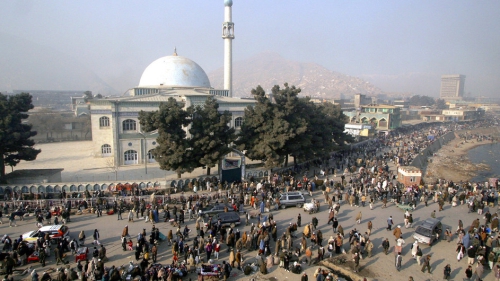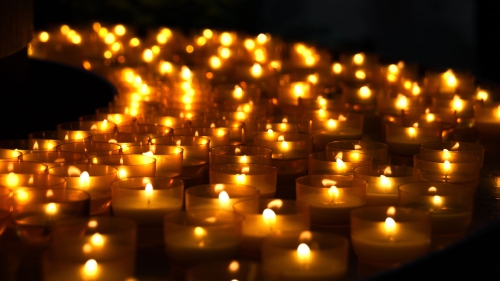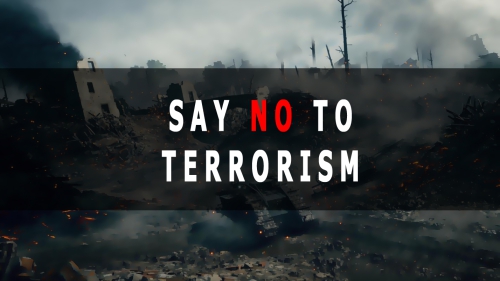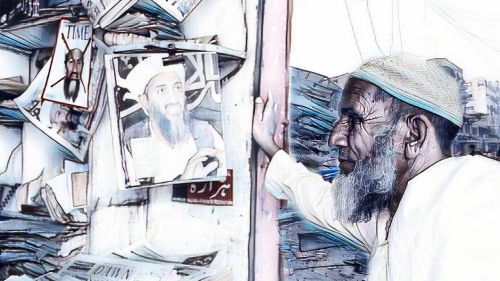Three Years After
Post 9/11 many in America asked "What Went Wrong?" and "Why do they hate us?" President George W. Bush was quick and careful to distinguish between the religion of Islam and the actions of extremists, many religious leaders and ordinary citizens reached out in concern to their Muslim neighbors and colleagues.
However, many others did not. Some leaders of the militant Christian Right charged that Islam was an evil religion, prone to acts of violence and terror. Many were persuaded that Islam must be a militant religion as they looked at the death of almost 3,000 people in the World Trade Center and Pentagon attacks and heard the words of Osama Bin Laden and other al-Qaeda leaders justifying acts of terrorism and calling for a jihad against Americans, against people of other faiths.
During the past three years a wave of global violence has extended from Europe and North Africa to Southeast Asia. Multiple terrorist attacks have occurred from Morocco and Spain to Turkey, Saudi Arabia, and Indonesia. The persistence of terrorism and the danger of recurrent attacks were symbolized by the most recent attack against the Australian Embassy in Jakarta, several years after the bombings in Bali.
The American presidential race has intensified questions about the U.S. role in the war against global terrorism, its policies in Iraq and the Middle East. It has led to heated debate about America's accomplishments and failures, the political and economic costs as well as the decline of America's moral authority in the world. The question asked about Islam and Muslims in the days after 9/11 - "What went wrong?" - can now be asked when assessing the Bush administration and the future of American foreign policy in the Middle East. The American-led war on global terrorism has not destroyed Al-Qaeda, limited the growth of extremist groups or lessened the threat of global terrorism. Studies and polls show that both extremism and anti- Americanism have in fact increased. The beliefs of much of the world, heads of state and popular opinion contrasted sharply with the views of George W Bush and Tony Blair. The war in Iraq, a war that did not enjoy the support of a broad-based coalition, did remove a bloody dictator. But Saddam was not, as maintained by the Bush administration, a regional or global threat who possessed WMDs, or a major supporter of Osama Bin Laden and Al-Qaeda.
In many parts of the Muslim world the war against global terrorism has come to be viewed as a war against Islam and Muslims. The image of America has become that of a neo-imperial power that has sought to redraw the map of the Middle East and the Muslim world, influenced by an unholy alliance of neo-conservatives and the militant Christian right, in an attempt to implement a New American century. US policies have alienated many friends and long time allies in Europe and the Arab world and fed anti- Americanism within and outside the Muslim world.
Post 9/11 many Muslim societies, from Morocco and Turkey to Saudi Arabia and Indonesia, have been victims of global terrorism. Government and religious leaders have been challenged to effectively respond to militant groups within their own countries. Unfortunately, the threat of global terrorism has become an excuse for some governments in the Middle East, Central, South and South East Asia to become more autocratic, to tighten their grip on power and to limit or crush any significant dissent, whether by moderates or militants, secular or religious.
At the same time, governments and elites in the Middle East must themselves address not only the immediate need to identify and eliminate extremist groups but also to address those political, economic and religious problems and issues that contribute to the alienation of sectors of their societies, to the growth of radicalism and violence. Issues of power-sharing, development of strong institutions of civil society, economic and educational development, a more equitable distribution of wealth and social services, and human rights remain critical. Equally important is the need to more effectively deal with those who in the name of Islam preach a theology of hate whether in mosques, madrasas or through fatwas that legitimate acts of violence and terror. Greater attention must be given to the fostering of religious pluralism and tolerance in society. The media has made great strides in recent years, providing ready access through modern technology to the news. However, in many countries the media must not only enjoy freedom of the press but also become more responsible. Too many are part of a media culture that tends to contribute to a culture of denial that ignores the failures and responsibility of their own leadership, elites and populace for many of their problems and instead is content to place sole blame on "others."
The failed policies of many governments and ruling elites, like the preachers of theologies of hate (whether Muslim or Christian), represent a powerful minority but it is important to remember they are a minority. As anyone familiar with America, Europe or the Muslim world knows, the mainstream majority, whatever their differences and grievances, share a common desire for peace, prosperity, freedom and security.
The most serious risk to the future is the continued failure to adequately address the root causes of global terrorism and of anti- Americanism. Although the Bush administration quite correctly talked about a three-pronged strategy (military, economic and public diplomacy), the tendency has been to reduce public diplomacy to a public relations campaign rather than a serious re-examination of American foreign policy and a more multilateral approach. In the immediate aftermath of 9/11 many were content to simply look to religious or cultural causes in answering the question: "Why do they hate us?" American policies (under both Democratic and Republican administrations), the impact of Iraqi sanctions that cost the lives of hundreds of thousands of Iraqi children, a double standard in America's support for the spread of democracy and human rights which saw American administrations support authoritarian regimes, lack of balance or parity in the Palestinian-Israeli conflict, from American policies and arms sales to its voting record in the UN, were all ignored. It will especially remain important to distinguish between Islam and the hijacking of Islam by religious extremists, between the vast majority of Muslims and the acts of a dangerous minority. Similarly, policymakers must continue to distinguish between mainstream Islamic social and political movements and the continued threat to the global community from a minority of terrorist movements.
9/11 has made the international community more aware of the critical importance of intercivilizational dialogue. Governments in Europe and America, the Muslim world and beyond as well as international organizations like the United Nations and Organization of the Islamic Conference have undertaken serious efforts to promote intercivilizational dialogue. The World Economic Forum created the council of 100 Leaders (political, religion, intellectual, media). Centers like Georgetown University's Center for Muslim-Christian Understanding, created in 1993 to promote a better understanding between the Muslim world and the West, have been active in Washington and globally speaking, briefing, and writing for a broad audience of university, government, media and corporate audiences worldwide.
In the coming years, it will remain critical for the United States and Europe to work in close partnership politically, militarily, economically and culturally with Middle East countries. Turkey is uniquely positioned geographically and historically at the crossroads between Europe and the Middle East; it has and can play an important role both in the war against global terrorism and as a bridge between the West and the Muslim world in the promotion of intercivilizational dialogue. Turkey's current government has demonstrated its commitment to playing an effective role both in fighting terrorism and promoting intercivilizational dialogue. Turkey's admission to the European Union as well as Western support for bilateral and multilateral projects can play a major role in strengthening mutual understanding, respect and constructive relations.
John L. Esposito is University Professor, Professor of Religion & International Affairs and Founding Director of the Center for Muslim-Christian Understanding, Georgetown University. A former President of the Middle East Studies Association and Vice Chair of the Center for the Study of Islam and Democracy, his most recent books include Unholy War: terror in the Name of Islam and What Everyone Needs to Know About Islam.
Related Suggestions
But InchAllah ISLAM we always rise and rise.
As far as I know, Islam never declare any War to Western but please take a very close look at your Government foreign policies which represent US citizens. especially at middle east!!! So stop nonsense
Please bear in mind that the real terrorists meaning the Zionists & their allies in Washington & their slaves in Arab & Muslim capitals will never enjoy the same freedom & security they had enjoyed for centuries until true Muslims dignity is restored & justice is served.
Then again, sometimes advancement requires the retreat from a local optimal (or local sticking point). And that requires the removal of old paradigms. Remember, to a conservative human advancement is backwards. Through out history, societies that have failed their spiritual tests were made conservative so that they retreated while the rest of the world advanced. And to do this required the stupid to dominate those intelligent enough to see what was happening and raise the alarm. (Islam after slavery became an integral part of the "kalifa" for instance. Or the U.S. now.)
Don't expect the west to demonstrate intellectual advancement. Dangerious that!
GREAT ARTICLE...

















